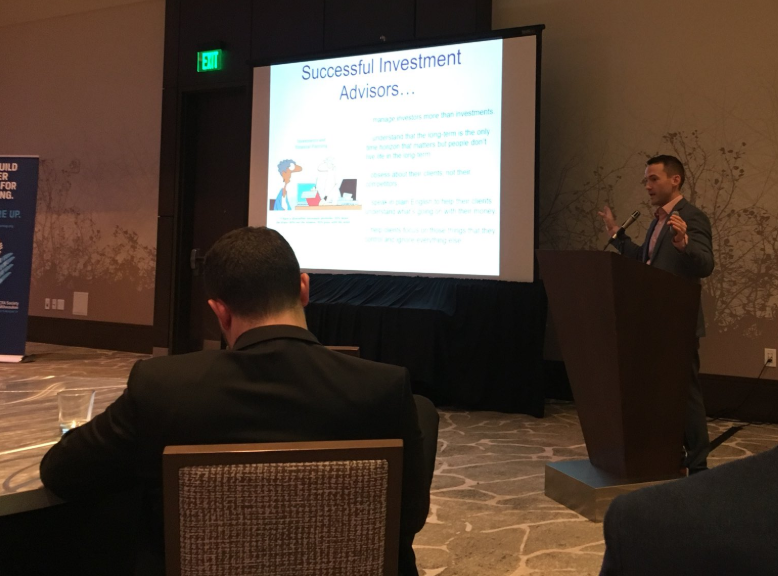
I had a great time in Wisconsin earlier this week talking to the CFA and FPA societies in Madison and Milwaukee.
My talks centered around where I think the financial services industry is going in the future, how to stand out from the crowd in an era where information is abundant, and why fighting new technology in the space is a bad idea.
I wanted to use a few slides I put together for these presentations to show what I’m talking about.
Anything that can be automated in the future will be automated:

These new Amazon Go stores are pretty slick. The idea is you scan your phone to sync your Amazon account when you walk in, grab what you want, walk out of the store with what you want, and Amazon automatically charges your account. There’s no need for cashiers or waiting in line (which is why this picture is so ironic — waiting in line for a store where the whole idea is not waiting in line).
This technology is great for people like me who hate waiting in lines. And have you ever seen other people try to use the self-checkout machines at a grocery store? Either they don’t work or people have no idea how to use them correctly.
The problem with this concept is there are nearly as many cashiers in this country as there are school teachers. This is also close to the number of truck drivers we have in America (all are somewhere in the 3-4 million range).
What happens to these 7-8 million cashiers and truck drivers in the future when the majority of grocery stores have no need for a cashier and the trucks are all driving themselves?
I don’t know when this is going to happen but if the technology works it’s going to be hard to deny these things will take place eventually. Some people assume this means 40% unemployment when the robots take all of our jobs. While there will certainly be a rough transition for segments of the labor force, I’m slightly more optimistic in how dynamic the U.S. economy is over time.
Do we really think all the stores and trucks will be void of people? No way.
Even when they’re fully autonomous, trucks will still need people on board to unload, provide security for the truck and cargo, set the routes, make course corrections when something goes wrong, and perform maintenance on the vehicles.
Stores will still need people even when there are no cashiers. One way to stand out from the crowd when technology levels the playing field is to provide a differentiated service. Shoppers will still have questions that will need to be answered. People will always appreciate recommendations, advice, and guidance.
The same thing will be true in financial services. Technology will continue to make our lives easier and offer investors more choices at lower fees. Many roles will have to evolve but people skills will always be important when dealing with a topic as fraught with stress, nerves, emotions, and uncertainty as money.
If we ever get functional artificial intelligence I think that will just make emotional intelligence even more important:

Psychologist Daniel Goleman wrote the book Emotional Intelligence in the mid-1990s to describe how we manage our emotions, along with our capacity to recognize our own feelings and the feelings of others. Goleman used studies that show emotional intelligence trumps IQ by a ratio of two-to-one when studying successful people.
Goleman describes five basic competencies for emotional intelligence:
- Self-Awareness is the ability to understand how emotions affect yourself and other people.
- Self-Regulation is the ability to control impulsive decisions.
- Motivation is having a passion for what you do along with a curiosity for learning.
- Empathy is the ability to understand the emotional makeup of other people.
- Social Skills come from building relationships and networking with others.
These skills are not going to be eroded by automation.
A few weeks ago a podcast listener asked us how different we think the financial services business will be in 25 years. I think about this from the other side of the coin — what’s going to be the same?
Here’s another slide I used to discuss this idea:

Technology will continue to change the way we do things over the coming decades in ways we probably can’t even imagine. But financial services will always require:
- trust
- people skills
- the correct temperament
- the ability to tell your story
- the ability to prove your value-add
- communication skills
- a focus on the investor more than the investments
The business will change. The technology will change. The people will change. The client’s needs and desires will change.
But the important building blocks of a successful financial services company will be the constant because I don’t think it’s going to be possible to effectively automate good people skills.
Further Reading:
Is Technology Speeding Up Market Cycles?
